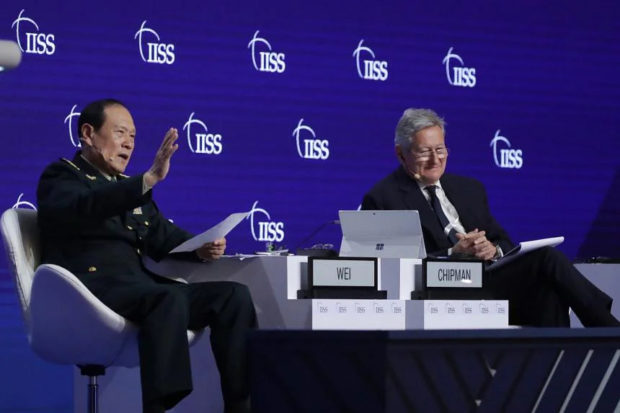
Chinese defence chief Wei Fenghe (left) said Beijing was committed to peaceful development and maintaining international order. The Straits Times/Asia News Network
SINGAPORE – Beijing warned on Sunday (June 12) that its relationship with the United States would not improve unless Washington stops trying to “suppress and contain China on all fronts”.
In a speech laying out China’s vision for regional order at Asia’s top security summit, the Shangri-La Dialogue, Chinese Defense Minister Wei Fenghe said Beijing was committed to peaceful development and maintaining international order, but stressed that it would “fight to the very end” if its core interests, such as Taiwan, were threatened.
“The China-US relationship is at a critical and crucial juncture,” General Wei said.
“It is a historic and strategic mistake to take China as a threat or enemy. We call on the US side to stop smearing and containing China, stop interfering in China’s internal affairs and stop harming China’s interests.
“The bilateral relationship cannot improve unless the US side can do that.”
Gen Wei firmly rejected the “smearing, accusations and even threats against China” made by US Defense Secretary Lloyd Austin in his speech the previous day.
As the world faces international crises including the coronavirus pandemic and the war in Ukraine, “we are all in the same boat and we cannot overcome the (crises) unless we work together”, he said.
“Building a high wall around one’s turf and forming parallel systems can only split the world and undermine the shared interests of all countries.
“We should seek peaceful coexistence and win-win cooperation rather than hegemony and power politics… No country should impose its will on others or bully others under the guise of multilateralism.”
The general stressed that China opposed “using competition” to define the US-China relationship.
Stable ties between the two powers are “vital for global peace and development”, serving everyone’s interests, while confrontation would benefit no one, he said.
While Gen Wei sought to project an image of China as a peaceful rising power, he also peppered his speech with dire warnings to those who may provoke it.
“No matter what stage of development it reaches, China will never seek hegemony,” he said.
“We do not provoke troubles, but we will not flinch in the face of provocation… We will not attack unless we are attacked… If anyone dares to attack us, the People’s Liberation Army (PLA) will not hesitate to fight back.”
He added: “China fully appreciates and respects the legitimate concerns of other countries. Likewise, we expect our core and legitimate interests to be respected.”
On the topic of Taiwan, he cautioned that those who pursue independence of the self-ruled island would face the full wrath of China and its military.
“Taiwan is first and foremost China’s Taiwan,” the general said, adding that peaceful reunification was “the utmost wish of the Chinese people” and that Beijing would “make the greatest effort to achieve that”.
“If anyone dares to secede Taiwan from China – let me be clear – we will not hesitate to fight. We will fight at all costs and we will fight to the very end. This is the only choice for China… No one should ever underestimate the resolve of the Chinese armed forces to defend China’s sovereignty and territorial integrity.”
China regards Taiwan as a renegade province awaiting reunification with the mainland, by force if necessary.
Under America’s Taiwan Relations Act, the US is obliged to provide Taiwan with the means to defend itself and has maintained a policy of “strategic ambiguity” over whether it will intervene in the event of any attack against the island, although Washington has repeatedly said it does not support Taiwan independence.
On issues pertaining to the South China Sea, Gen Wei insisted that “freedom of navigation is not under threat” in the disputed waters.
But “some big power” has sent “warships and warplanes on a rampage… meddling in this region and turning the South China Sea into troubled waters”, he said, in a veiled criticism of Washington’s regular freedom of navigation operations in the area.
China claims about 90 per cent of the South China Sea, through which trillions of dollars in shipping trade passes annually. Rival claimants include Brunei, Malaysia, the Philippines, Taiwan and Vietnam.
Gen Wei said stakeholders in the contested region should settle their maritime disputes among themselves through consultation, while others should avoid interfering.
Dr Yun Sun, a senior fellow and co-director of the East Asia and China programs at the Stimson Center and a delegate at the Shangri-La Dialogue, was not optimistic about relations between the two powers improving in the short term.
“Improvement is possible, but unlikely to be any strategic shift,” she said.
“At this stage, the next step will be communications for crisis management purposes… It is not about whether the nature of the (US-China) relationship is competitive – there is no more debate on that – but about how the competition will transpire, and whether it will end up with a catastrophe.”
Another delegate, Professor Chong Ja Ian, a US-China relations expert from the National University of Singapore, said it was “ironic” that there were in fact many similarities in both Beijing’s and Washington’s objectives, such as seeking multilateralism, openness and inclusivity.
“But the way each one interprets how its vision can be realised presents the other as a potential complication to achieving those objectives,” he said.
To improve ties, both sides would have to “recognise the need to make some adjustments”, he added.
“But if you look at the domestic situation in the US and at the general rhetoric in Beijing, there is very little political will for accommodation at this point. So everything rests ultimately on the political leadership.”
RELATED STORIES
Chinese defense chief says up to US to improve bilateral ties
US blasts China’s ‘destabilizing’ military activity near Taiwan
China says carried out drills near Taiwan
Blinken aide: US rebuffs China ‘aggression’ in SCS; PH rights must be defended